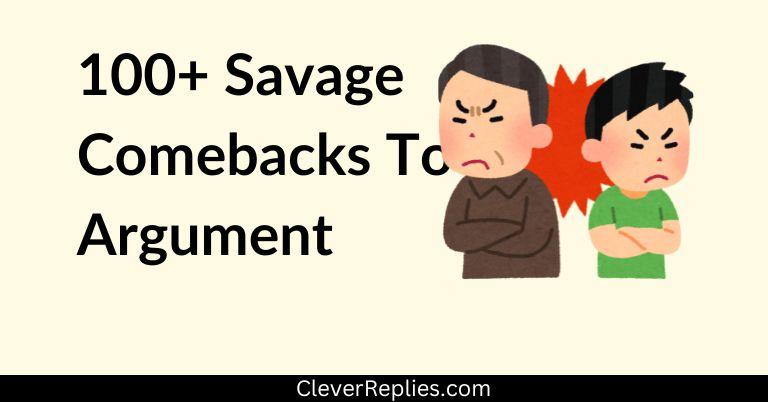100+ Savage Comebacks To Use in an Argument
When debates get intense, having the right comeback is crucial. But why settle for ordinary when you can use savage comebacks that get straight to the point?
You might not realize it, but a clever, biting response can help you win the argument—or at least give you a sense of victory and closure!
In this post, we’ll provide 150+ savage comebacks that are perfect for flipping any debate in your favor.
These comebacks will add some edge to your conversations and ensure you make your point with confidence.
Get ready to elevate your debating skills and tackle any argument head-on!
100+ Savage Comebacks To Use in an Argument | Clever Replies
Ready to elevate your argument game and assert your dominance? Dive into these 100+ comebacks that are sure to give you the upper hand.
Each one is crafted to make a memorable impact, ensuring you get the last word and leave your opponent speechless.
One-liners for Instant Wins

If you’re looking to end the debate with a single line, these 30 One-Liners can help you deliver a powerful punch & turn any debate in your favor:
- “Nice try, but you’re still wrong.”
- “I’m not arguing; I’m just better informed.”
- “It’s adorable how you think you’re right.”
- “That’s cute. I’m not impressed, though.”
- “You must love the sound of your own voice.”
- “Your opinion is noted, and promptly ignored.”
- “I see your point, but it’s flawed beyond repair.”
- “I’d agree with you, but then we’d both be wrong.”
- “Do you ever stop talking, or is it a full-time job?”
- “You’re not just wrong; you’re spectacularly wrong.”
- “Are you always this misinformed, or is it just today?”
- “I’d argue with you, but I don’t argue with amateurs.”
- “I’m impressed by your ability to misunderstand everything.”
- “I’d explain it to you, but I left my patience at home.”
- “I see you’re still talking. I thought you were finished.”
- “I’m not arguing with you; I’m explaining why I’m right.”
- “Is that the best you’ve got? Because it’s pretty weak.”
- “I’m glad you think that, but reality has a different plan.”
- “That’s a nice perspective, but it’s completely irrelevant.”
- “I’m sorry, I didn’t realize you were an expert on everything.”
- “You know, You’re not stupid, but you have bad luck thinking.”
- “You’re entitled to your opinion, but it doesn’t mean it’s right.”
- “If ignorance is bliss, you must be the happiest person alive.”
- “I’d respond to your comment, but I don’t speak nonsense.”
- “If I wanted to hear from an expert, I’d ask someone else.”
- “I didn’t realize I was in the presence of a professional idiot.”
- “Are you always this condescending, or is today a special occasion?”
- “I’m not sure if you’re being intentionally ignorant or if it’s just your default setting.”
- “I’m trying to see things from your perspective, but I can’t get my head that far up my…”
- “You must have been born on a highway because that’s where most accidents happen.”
Also Read: Savage Replies To the Insult (30+ Phrases to use)
Intellectual Burns That Outsmart

Sometimes, the best way to win an argument is by outsmarting your opponent with sharp and insightful replies.
These 30 sharp and intellectual burns aim to showcase your knowledge and reasoning, ensuring your comebacks not only hit hard but also highlight your superior understanding.
If you want to demonstrate both your expertise and your ability to think on your feet, these burns will leave a significant impression and help you dominate any discussion.
- “Are you arguing, or just reciting noise?”
- “Interesting. If only it were based on reality.”
- “Your argument is like a checklist of fallacies.”
- “You’ve mistaken your opinion for a fact again.”
- “I didn’t realize we were debating science fiction.”
- “I’d agree with you, but then we’d both be wrong.”
- “You bring so much light to the room by leaving it.”
- “I’ve seen deeper insights in a puddle after the rain.”
- “You have a point, it’s just irrelevant to the conversation.”
- “Your argument is as solid as a house built on quicksand.”
- “I can see why you’d think that, but wrong is still wrong.”
- “You’ve got the enthusiasm, now try working on the logic.”
- “If you’re trying to make a point, you’re going in circles.”
- “You’re entitled to your own opinion, but not your own facts.”
- “It’s impressive how wrong you can be with such confidence.”
- “That’s a creative interpretation of the facts, I’ll give you that.”
- “I applaud your passion, but facts are a good companion to have.”
- “It’s not that I can’t explain it to you, it’s that you won’t understand it.”
- “Your reasoning is like a broken GPS—it’s taking us nowhere fast.”
- “That sounds like something you heard in a YouTube comment section.”
- “I’d love to hear your argument again, once it’s based on something real.”
- “Your logic is like a screen door on a submarine—impressive, but useless.”
- “I’m not sure where you learned logic, but I hope it came with a refund policy.”
- “Your assumptions are only valid if we’re operating in an alternate universe.”
- “I’m trying to find the part of your statement that makes sense, but it’s elusive.”
- “Thank you for sharing that. It’ll be a great example of what not to do in the future.”
- “It’s amazing how much you can say without actually saying anything of substance.”
- “I’m sure you have a reason for believing that. I just hope it’s better than the one you gave.”
- “If you put as much effort into understanding as you do into arguing, we might get somewhere.”
- “I can see your argument has legs—it’s just unfortunate that they’re running in the wrong direction.”
ALSO READ: 51 Funny Quotes To Annoy a Narcissist
Witty and Sarcastic Replies That Leave a Mark

Witty and sarcastic replies use irony, wordplay, and exaggeration. They differ from straightforward responses by adding humor and sharpness to conversations.
These replies aim to make conversations more engaging and lively, though they should be used carefully to avoid misunderstandings.
Here are 25 witty and sarcastic replies:
- “You must have been a joy to raise.”
- “If you spoke your mind, you’d be speechless.”
- “Do you ever listen to yourself? It must be exhausting.”
- “I’m not saying you’re dull, but you make a great nap aid.”
- “I’m here to help, but I won’t if it involves you talking more.”
- “Your secrets are always safe with me. I never even listen.”
- “You’re like a software update—annoying and not needed.”
- “I’d love to chat, but I’m too busy being amazing elsewhere.”
- “You bring everyone so much joy when you leave the room.”
- “Your brain must be on vacation—please let it come back soon.”
- “You should really wear a warning sign: ‘May cause headaches’.”
- “I’m sure you have a lot to say, but I’m too busy being fabulous.”
- “I’m sorry, I didn’t catch that. I was too busy trying to ignore you.”
- “I’m sorry, I can’t hear you over the sound of how awesome I am.”
- “I’m not ignoring you; I’m just giving you the silence you deserve.”
- “Do you need a minute to rethink that, or is that your final answer?”
- “I’m not a photographer, but I can definitely picture you being wrong.”
- “Oh, I didn’t realize I was in the presence of a professional know-it-all.”
- “I’m on a seafood diet. I see food and I ignore it—like your comments.”
- “Is that your final answer, or are you still searching for a better mistake?”
- “That’s a nice idea. I’ll add it to my collection of ‘never going to happen’.”
- “I’m sorry, were you speaking? I only respond to intelligent conversation.”
- “That’s a fantastic idea—if you’re aiming for a new record in bad decisions.”
- “I’d love to continue this conversation, but I left my patience somewhere else.”
- “Congratulations, you’ve just set a new record for how fast you can annoy me.”
ALSO READ: 50 Sincere Ways to Say Thank You for a Wonderful Event
30 Good Comebacks for Winning Arguments

While savage comebacks deliver a powerful punch, there are moments when a more nuanced approach is required to truly outwit your opponent.
The following list of good comebacks will help you address opposing points with clarity and finesse, ensuring you maintain control of the conversation without sacrificing the strategic edge.
These replies also strike a balance between assertiveness and respect, offering responses that are both thoughtful and effective.
- “Your point is understandable, but it’s not the whole story.”
- “I see your point, but let’s consider it from a different angle.”
- “That’s a strong point, but let me offer a different perspective.”
- “That’s a fair point, but it doesn’t address the issue completely.”
- “I get that you feel that way, but the evidence suggests otherwise.”
- “That’s one way to look at it, but let’s consider the broader picture.”
- “I get your perspective, but the data supports a different conclusion.”
- “Your argument is well-constructed, but it overlooks [specific detail].”
- “I appreciate your view, but let’s dig a bit deeper into the evidence.”
- “I understand your stance, but the reality is more nuanced than that.”
- “You’ve made a valid point, but I have to disagree because [reason].”
- “I hear what you’re saying, but here’s why I still think my point holds.”
- “I see your logic, but here’s why it doesn’t fully apply to this situation.”
- “That’s a solid argument, but it doesn’t consider [alternative viewpoint].”
- “That’s an interesting perspective, but here’s why it doesn’t quite add up.”
- “I respect your opinion, but I have to disagree based on [specific reason].”
- “I can see why you think that, but let’s examine the facts a bit more closely.”
- “That’s an interesting take, but it doesn’t fully account for [specific reason].”
- “I appreciate your input, but I believe there’s a crucial factor you’re overlooking.”
- “Your argument is valid, but it doesn’t fully address the complexity of the issue.”
- “You’ve brought up some good points, but I think there’s more to consider here.”
- “I can understand your viewpoint, but it doesn’t change the facts on the ground.”
- “I see where you’re coming from, but my position is based on [specific evidence].”
- “I hear your concerns, but the broader evidence suggests a different outcome.”
- “I get your point, but let’s not ignore the significant factors that lead to my position.”
- “You raise a good argument, but it’s not as black and white as you’re presenting it.”
- “You have a valid point, but here’s why I still think we’re headed in the right direction.”
- “I can see why you might think that, but I believe there’s a more accurate interpretation.”
- “You’ve made a good argument, but it’s based on assumptions that don’t align with the facts.”
- “I understand where you’re coming from, but I still stand by my argument because of [reason].”
ALSO READ: 52+ Ways to Express Your Thanks for the Financial Support
Conclusive Replies to End Any Argument
Now that we’ve discovered the savage and good comebacks, let’s focus on replies designed to decisively end any debate.
Here are 30 argument-enders that effectively shut down any further debate:
- “I’m done discussing this; I’ve made up my mind.”
- “The more we talk, the more I’m convinced I’m right.”
- “I’ve listened to all sides; my decision remains firm.”
- “I think we’ve exhausted this topic, so let’s move on.”
- “We’re not getting anywhere with this; let’s wrap it up.”
- “Your argument is clear, and my stance is unchanged.”
- “Your point has been noted and thoroughly dismissed.”
- “This conversation is over because I’m out of patience.”
- “I’ve considered your points and stand by my decision.”
- “I’ve heard your side and it hasn’t changed my position.”
- “We can continue this, but I’ve already decided I’m right.”
- “The discussion is now closed. Thank you for your input.”
- “We’ve reached an impasse, so let’s consider this settled.”
- “This debate isn’t adding value anymore; it’s time to end it.”
- “I’m not interested in debating further; my position is clear.”
- “I’m closing this debate; it’s not leading anywhere productive.”
- “I appreciate your perspective, but it doesn’t change my view.”
- “It’s been enlightening, but I’m sticking with my original stance.”
- “It seems we’re going in circles. Can we call this one a draw?”
- “I value your opinion, but it’s not going to change the outcome.”
- “I appreciate your input, but I’ve made my decision and it’s final.”
- “You’ve made your case; I’ve made mine. Let’s agree to end this.”
- “I’ve reached my conclusion, and further debate is unnecessary.”
- “Our views are too different to reconcile; let’s end this discussion.”
- “The argument has reached its natural end; I’m concluding it now.”
- “I think we’ve both made our points; let’s move on to something else.”
- “This topic is settled from my perspective; no need to discuss further.”
- “I’ve made my decision based on all the facts; this discussion is closed.”
- “I’m moving forward with my choice; any further discussion is redundant.”
- “Let’s agree to disagree because you’re clearly not going to change my mind.”
ALSO READ: 101+ Laugh-Out-Loud Quotes For A Shirt Signing Day
Best Practices to Handle Arguments

When using comebacks in arguments, the real challenge is managing the conversation after your point is made. Here’s how to effectively implement and handle responses:
1. Observe Reactions
Pay close attention to how your comeback is received. If your response triggers a strong emotional reaction, be prepared to address it calmly. Acknowledge their feelings if necessary and redirect the conversation to avoid escalation.
2. Maintain Composure
If your comeback is met with resistance or further debate, remain composed. Use the opportunity to clarify your point or address any misunderstandings. This helps keep the conversation productive and prevents it from devolving into personal attacks.
3. Provide Context
If your comeback sparks confusion or requires further explanation, be ready to elaborate. Offer additional context or examples to ensure that your point is fully understood and to reinforce your argument.
4. Show Empathy
Recognize that sharp comebacks can sometimes hit a nerve. If you sense discomfort or defensiveness, show empathy and offer to discuss their perspective further. This approach helps to keep the conversation respectful and constructive.
5. De-escalate When Needed
If the argument becomes too heated, suggest a break or change the subject. Acknowledge that both viewpoints have been heard and propose moving on to a different topic to prevent further escalation.
6. Reflect and Adjust
After the argument, take a moment to reflect on how your comebacks were received. Consider what worked well and what didn’t, and adjust your approach for future discussions based on this reflection.
By following these steps, you’ll be better equipped to manage the dynamics of an argument, ensuring your comebacks lead to meaningful and respectful exchanges.
Final Thoughts
As you apply these comebacks in your arguments, remember that the goal is not just to “win” the argument but to engage in meaningful dialogue.
By staying respectful and focusing on constructive exchanges, you ensure that your responses contribute positively to the conversation, maintaining credibility and integrity.

